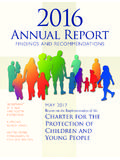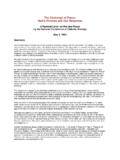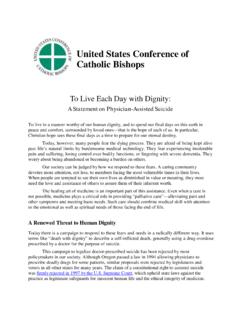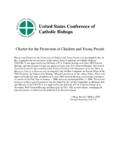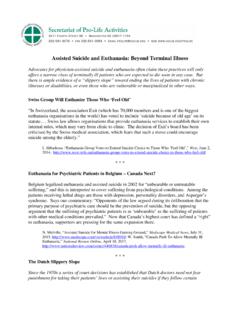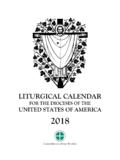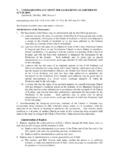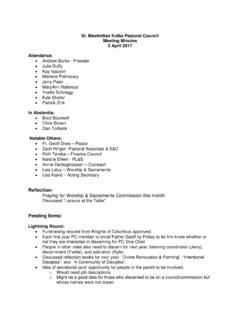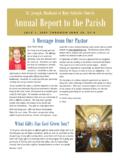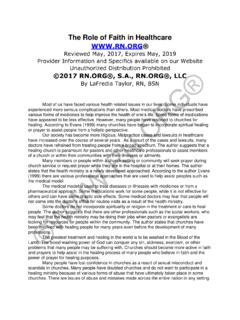Transcription of An Online Resource for Dioceses and Eparchies
1 Sacramental CatechesisAn Online Resource for Dioceses and EparchiesCommittee on Evangelization and CatechesisUnited states conference of catholic BishopsSacramental CatechesisAn Online Resource for Dioceses and EparchiesCommittee on Evangelization and CatechesisUnited states conference of catholic BishopsWashington, DCSacramental Catechesis: An Online Resource for Dioceses and Eparchies was developed as a Resource by the Committee on Evangelization and Catechesis of the united states conference of catholic bishops (USCCB). It was reviewed by the committee chairman, Bishop David L. Ricken, and has been authorized for publication by the Ronny E. Jenkins, JCDG eneral Secretary, USCCBS cripture excerpts used in this work are taken from the New American Bible, revised edition 2010, 1991, 1986, 1970 Confraternity of Christian Doctrine, Inc., Washington, DC. All rights reserved. No part of this work may be reproduced or transmitted in any form or by any means, electronic or mechanical, including photocopying, recording, or by any information storage and retrieval system, without permission in writing from the copyright from the Catechism of the catholic Church, second edition, copyright 2000, Libreria Editrice Vaticana united states conference of catholic bishops , Washington, DC.
2 Used with permission. All rights from Pope Benedict XVI, Address, September 23, 2011, copyright 2011, Libreria Editrice Vaticana (LEV), Vatican City; Benedict XVI, Verbum Domini, copyright 2010, LEV; Blessed John Paul II, Catechesi Tradendae, copyright 1979, LEV; John Paul II, Ecclesia de Eucharistia, copyright 2003, LEV. Used with permission. All rights 2012, united states conference of catholic bishops , Washington, DC. All rights reserved. No part of this work may be reproduced or transmitted in any form or by any means, electronic or mechanical, including photocopying, recording, or by any information storage and retrieval system, without permission in writing from the copyright of VitalitySigns for ConcernAudiencePart One: Contemporary Challenges to Sacramental CatechesisSecularismRelativismA Faulty AnthropologyA Weakened Sacramental Worldview Catholics Leaving the ChurchShortcomings in Catechetical FormationConclusion: Data from Center for Applied Research in the Apostolate (CARA) SurveysPart Two: Responding to the ChallengesEight Principles for All Doctrinally Sound Catechesis1.
3 Trinitarian Communion as the Foundation of Ecclesial Communion2. Christological Centrality3. The Church as Sacrament in the World4. Ecclesial Communion5. The Church s Mission Ad Gentes and the New Evangelization6. Sacramentality and a Sacramental Worldview7. Christian Moral Life: Personal and Social Dimensions That Include Stewardship8. Growth in Christian Prayer and in the Spiritual LifeThe Seven SacramentsDoctrinally and Pastorally Sound Sacramental Catechesis in General General Principles for the Sacraments of InitiationBaptismConfirmation/Chrismatio nThe EucharistPenance and ReconciliationAnointing of the SickHoly OrdersMatrimonyOpportunities for Sacramental CatechesisThe Baptismal CatechumenateThe Liturgy as a Catechetical MomentHomilies at Mass and at Other Liturgical CelebrationsIntercultural ParishesFamily CatechesisFormation for Parish MinistryParish Outreach MinistriesSacramental Catechesis for Persons with Disabilities Mixed Marriage CouplesOutreach Through MediaConclusionAppendix 1: Select Resources on Sacramental Catechesis on (Arch)Diocesan and Eparchial WebsitesAppendix 2.
4 Sacramental Catechesis BibliographyScriptureCanon LawDocuments of the Universal ChurchPapal DocumentsDocuments from Vatican Offices/CongregationsDocuments from USCCB1 The sacraments are efficacious1 signs of grace, instituted by Christ and entrusted to the Church, by which divine life is dispensed to us through the work of the Holy Spirit. 2In the Trinity s mysterious and loving plan, God the Father sent his beloved Son into the world for the salvation of the world and the glory of his Jesus Christ, the Word made flesh, through his saving Passion, Death, Resurrection, and glorious Ascension,4 accomplished the work of our Since the first Pentecost, the Holy Spirit has continued to make present to the Church this sav-ing action of Christ in the sacraments, culminating in the celebration of the Eucharistic sacrifice. The Church draws her life from the Word and the Body of Christ, and so herself becomes Christ s Body. 6 The Church is itself Christ s continuing presence in the world and mediator of God s The Seven Sacraments, called the Holy Mysteries by the Eastern Churches, continue the saving work 1 Catechism of the catholic Church (CCC) (2nd ed.)
5 (Washington, DC: Libreria Editrice Vaticana united states conference of catholic bishops [USCCB], 2000), no. 1127. Efficacious means that the sacra-ments bring about a result. The sacraments are effica-cious because in them Christ himself is at work: it is he who baptizes, he who acts in his sacraments in order to communicate the grace that each sacrament signifies. (CCC, no. 1127). Unlike the seven sacraments, sac-ramentals ( , holy water, statues, rosaries, religious medals) do not bring the grace of Christ efficaciously. While they also bring the grace of Christ, their fruits depend more directly on the disposition of the one who makes use of them or prays with CCC, Glossary, p. 898. 3 CCC, no. CCC, Glossary, p. See CCC, no. 1067. See also united states catholic Cate-chism for Adults (USCCA) (Washington, DC: USCCB, 2006), Chapter CCC, Glossary, p. CCC, nos. Jesus throughout time and space until he comes again; they form the center of the celebration of the Christian sacraments were instituted by Christ and are an encounter with They are actions of the Holy Spirit at work in his Body, the Through this encounter, God s sac-ramental grace11 the grace of the Holy Spirit given by Christ and proper to each sacrament is communicated12 to those properly disposed to receive Sacraments confer the grace that they signify.
6 14 In each sacrament, the faithful are enabled to give fitting worship to God who puri-fies them, calls them to worship, and serves as the object of their worship. Through the saving action of Christ at work in each of the sacraments, the whole of creation is increasingly healed and sanc-tified so that it can once again give glory to the 8 CCC, nos. 1076, 1099; USCCA, CCC, nos. 1114-1116. Adhering to the teaching of the Holy Scriptures, to the apostolic traditions, and to the consensus .. of the Fathers, we profess that the sacraments of the new law were .. all instituted by Jesus Christ our Lord (CCC, no. 1114, quoting Council of Trent [1547], DS 1600 1601). Jesus words and actions during his hidden life and public ministry were already salvific, for they anticipated the power of his Paschal mystery. They announced and prepared what he was going to give the Church when all was accomplished (CCC, no.)
7 1115).10 CCC, no. 1116. 11 Grace is the life and activity of God in our souls. See CCC, no. 1999: The grace of Christ is the gratuitous gift that God makes to us of his own life, infused by the Holy Spirit into our soul to heal it of sin and to sanctify it. See also CCC, nos. See CCC, Glossary, p. 898: A sacrament is an effica-cious sign of grace, instituted by Christ and entrusted to the Church, by which divine life is dispensed to us through the work of the Holy Spirit. 13 CCC, no. CCC, no. 1127. See also CCC, no. 1131: The visible rites by which the sacraments are celebrated signify and make present the graces proper to each sacrament. IntroduCtIon2 Father. Likewise, recipients are enabled to serve in charity, grow in holiness, and form one body in union with Christ through the action of the Holy In well-disposed recipients, the sacraments are efficacious that is, they confer the grace they signify (ex opere operato),16 because the Lord who instituted the sacraments is also the one who con-fers and dispenses them through the minister of the Seven Sacraments are properly ordered according to three designations.
8 Baptism, Confir-mation, and the Eucharist are the three Sacraments of Christian Initiation, which lay the foundation for the Christian Penance and Reconciliation and the Anointing of the Sick are the Sacraments of Healing. Through them the Church continues, in the power of the Holy Spirit, to accomplish Christ s work of healing and salvation among the Christian Matrimony and Holy Orders are the Sacraments at the Service of Communion. They confer a special mission of service to the Peo-ple of diocesan bishop, as chief teacher of the faith, exercises his responsibility to provide the faithful with doctrinally sound faith formation that integrates knowledge of the faith with living the Assisted by his priests, deacons, reli-gious, and laity,22 he cares for the proper formation of all who approach the Church for the reception and the celebration of the sacraments. In order to enable a deeper understanding and commitment to an active and worthily celebrated sacramental life, this sacramental catechesis is both preparatory and ongoing.
9 Such sacramental catechesis does not take place in a vacuum. Its reception and fruitfulness is 15 CCC, nos. 1123-1127; USCCA, CCC, no. 1128: Ex opere operato (literally: by the very fact of the action s being performed ). 17 CCC, no. See CCC, no. 1212. See also National Directory for Cate-chesis (NDC) (Washington, DC: USCCB, 2006), no. 36 CCC, no. 1421; NDC, no. 36 CCC, nos. 1534-1535; NDC, no. 36 C; USCCA, NDC, nos. 33, 35 NDC, no. by many changes that touch the lives of the catholic faithful, along with those of the rest of society. These changes may either encourage or block a relationship with God rooted in a commu-nity of faith and committed to an active sacramen-tal sIgns of VItalItySeveral encouraging signs of vitality may be identi-fied today in the life of the Church in the united states . The catholic population in the united states continues to grow and diversify, in part due to the influx of a number of immigrant groups. The implementation of the Rite of Christian Initiation of Adults continues to provide large numbers of newly initiated members and to inspire all forms of The revised third edition of the Roman Missal provides a wonderful opportunity to focus on the centrality of the Eucharist and to invite the faithful to a renewed commitment to active par-ticipation in the Mass and worthy reception of the Eucharist.
10 The ministry of priests, deacons, and religious, in union with the active participation of the lay faithful in pastoral life, serves as a leaven to transform day-to-day life. Catholics in the united states continue to recognize Jesus present in those suffering from numerous natural and man-made disasters and to provide outreach to the poor and vulnerable as he commanded his followers to Another positive sign is the increasing number of dedicated catechists and catholic school teachers engaged in initial and ongoing sacramental forma-tion for a continuum of age groups and A catechetical renewal is underway, guided by the Catechism of the catholic Church, the united states catholic Catechism for Adults, and the National 23 See General Directory for Catechesis (Washington, DC: LEV USCCB, 1998), nos. 14-33; NDC, nos. 3-4, 12-14; and Our Hearts Were Burning Within Us: A Pastoral Plan for Adult Faith Formation in the united states (Washing-ton, DC: USCCB, 1999), nos.
